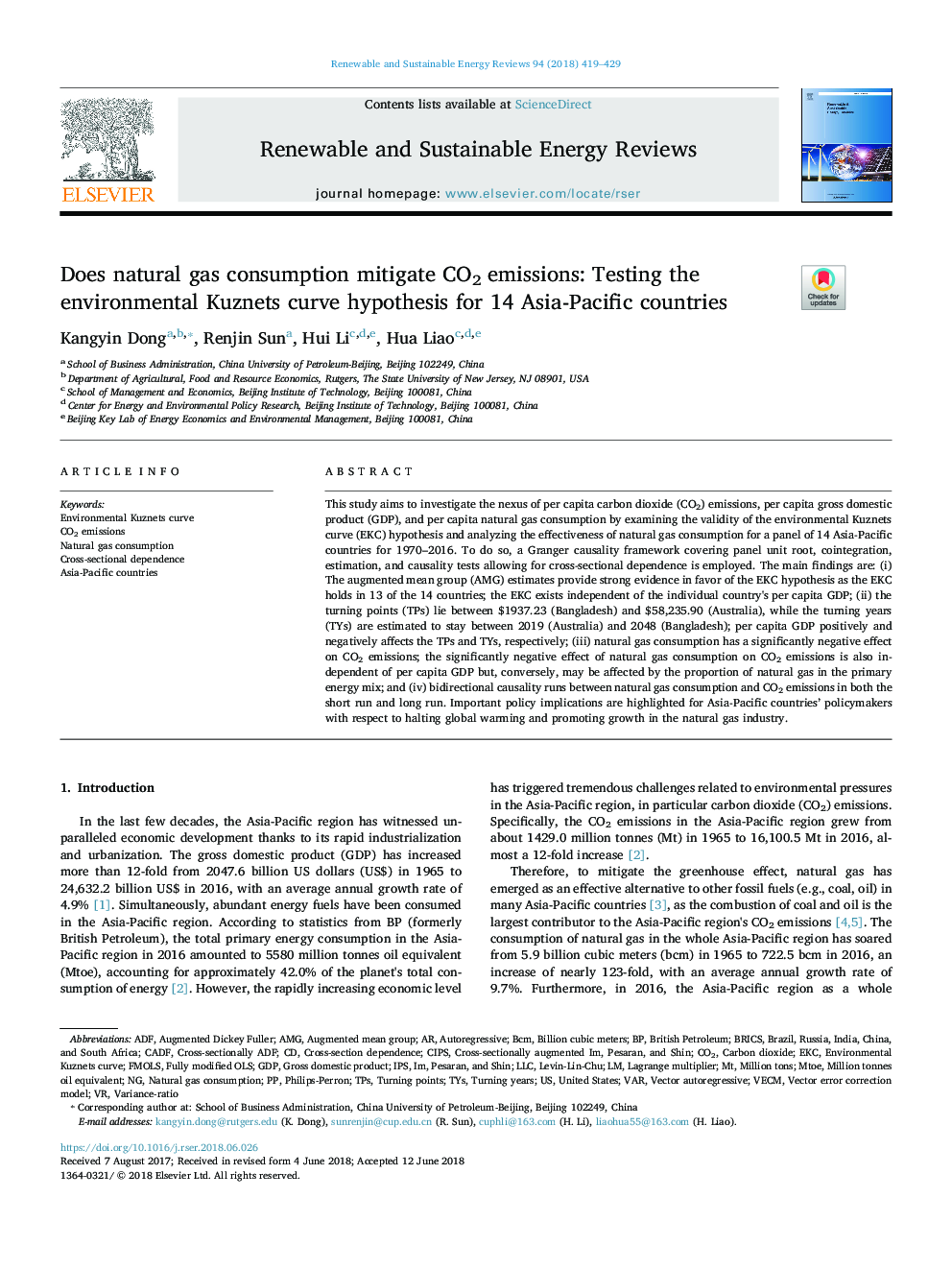| کد مقاله | کد نشریه | سال انتشار | مقاله انگلیسی | نسخه تمام متن |
|---|---|---|---|---|
| 8110446 | 1522290 | 2018 | 11 صفحه PDF | دانلود رایگان |
عنوان انگلیسی مقاله ISI
Does natural gas consumption mitigate CO2 emissions: Testing the environmental Kuznets curve hypothesis for 14 Asia-Pacific countries
دانلود مقاله + سفارش ترجمه
دانلود مقاله ISI انگلیسی
رایگان برای ایرانیان
کلمات کلیدی
ADFAugmented Mean GroupMtoeCADFAMGFMOLSVECMEKCLLCTPsBCMcIPS - CIPSiPS - IPSVector autoregressive - اتوکد بردارAugmented Dickey Fuller - افزوده شده دیکی فولرCO2 emissions - انتشار گاز CO2United States - ایالات متحده آمریکاBRICS - بریتانیاBritish Petroleum - بریتیش پترولیومGross domestic product - تولید ناخالص داخلیGDP - تولید ناخالص ملیAutoregressive - خودپندارهCarbon dioxide - دیاکسید کربنLagrange multiplier - لاگرانژ ضرب شودVector error correction model - مدل تصحیح خطای خطوطNatural gas consumption - مصرف گاز طبیعیEnvironmental Kuznets curve - منحنی Kuznets محیط زیستbillion cubic meters - میلیارد متر مکعبmillion tons - میلیون تنTurning points - نقاط عطفCross-sectional dependence - وابستگی متقابلCross-section dependence - وابستگی متقابلCO2 - کربن دیاکسیدVAR - که در آن
موضوعات مرتبط
مهندسی و علوم پایه
مهندسی انرژی
انرژی های تجدید پذیر، توسعه پایدار و محیط زیست
پیش نمایش صفحه اول مقاله

چکیده انگلیسی
This study aims to investigate the nexus of per capita carbon dioxide (CO2) emissions, per capita gross domestic product (GDP), and per capita natural gas consumption by examining the validity of the environmental Kuznets curve (EKC) hypothesis and analyzing the effectiveness of natural gas consumption for a panel of 14 Asia-Pacific countries for 1970-2016. To do so, a Granger causality framework covering panel unit root, cointegration, estimation, and causality tests allowing for cross-sectional dependence is employed. The main findings are: (i) The augmented mean group (AMG) estimates provide strong evidence in favor of the EKC hypothesis as the EKC holds in 13 of the 14 countries; the EKC exists independent of the individual country's per capita GDP; (ii) the turning points (TPs) lie between $1937.23 (Bangladesh) and $58,235.90 (Australia), while the turning years (TYs) are estimated to stay between 2019 (Australia) and 2048 (Bangladesh); per capita GDP positively and negatively affects the TPs and TYs, respectively; (iii) natural gas consumption has a significantly negative effect on CO2 emissions; the significantly negative effect of natural gas consumption on CO2 emissions is also independent of per capita GDP but, conversely, may be affected by the proportion of natural gas in the primary energy mix; and (iv) bidirectional causality runs between natural gas consumption and CO2 emissions in both the short run and long run. Important policy implications are highlighted for Asia-Pacific countries' policymakers with respect to halting global warming and promoting growth in the natural gas industry.
ناشر
Database: Elsevier - ScienceDirect (ساینس دایرکت)
Journal: Renewable and Sustainable Energy Reviews - Volume 94, October 2018, Pages 419-429
Journal: Renewable and Sustainable Energy Reviews - Volume 94, October 2018, Pages 419-429
نویسندگان
Kangyin Dong, Renjin Sun, Hui Li, Hua Liao,